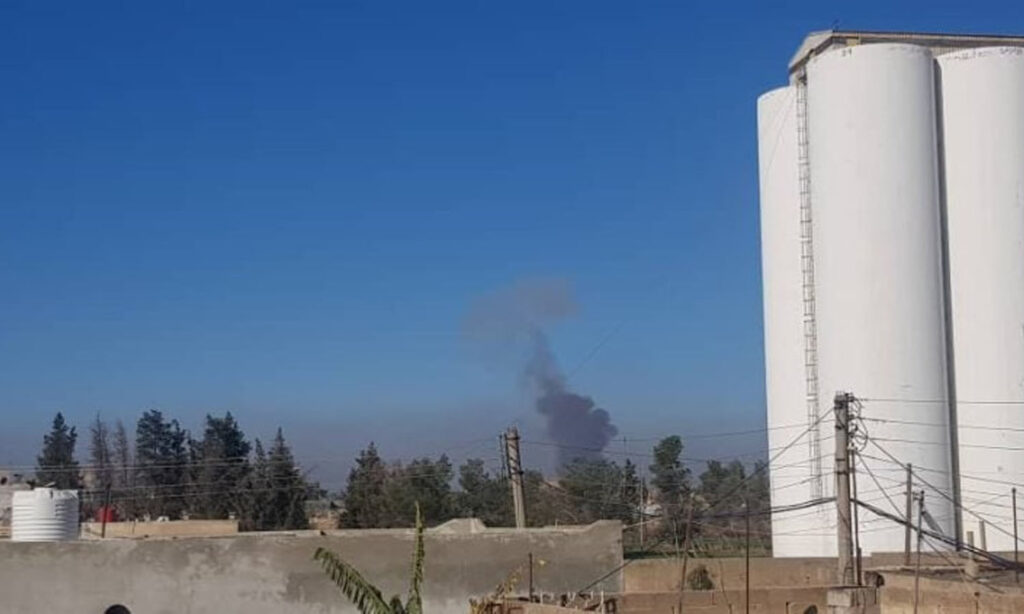A series of Turkish attacks in northeastern Syria over the past few days has led to the displacement of civilians in the al-Hasakah province.
Enab Baladi’s correspondent in al-Hasakah reported that Turkish aircraft had targeted several locations in the past days where elements of the Syrian Democratic Forces (SDF) were stationed, which were previously used as service facilities.
From its side, the Autonomous Administration of North and East Syria (the political umbrella of the SDF) announced that the shelling resulted in the killing and injury of civilians. Meanwhile, the Turkish Ministry of Defense stated that it killed at least 26 SDF fighters, which Ankara considers an extension of groups classified as “terrorist” on its list.
Mass displacement
Amid the repeated Turkish attacks, the city of Qamishli and its surrounding villages witnessed a new wave of mass displacement from the area at a time when civilian casualties and property damage were recorded.
Three residents of the area, who left their homes after the escalation, told Enab Baladi that they were forced to leave their homes to avoid the damage resulting from the bombing.
Some sought refuge in safer neighboring areas, while others chose to stay in the open due to the lack of alternatives for them.
At the same time, as residents search for a safe haven, some periodically check their homes out of fear of potential theft amid the chaos in the region.
Fawzi Abdi, 44, a resident of Qamishli, currently residing in a tent on the road connecting the cities of Amuda and Malikiyah, told Enab Baladi that he fled the aerial bombardment targeting the city.
He added that he refuses the idea of returning to his home in the near future due to the continued airstrikes and rocket shelling on various areas in Qamishli and its outskirts.
Abdi stated that his decision to return home or stay in the tent is linked to the security situation in the region and the cessation of the shelling.
Fadia Antar, also a displaced person from Qamishli, settled with her four children and husband in al-Hasakah, driven by fear of the recent aerial strikes witnessed in the city.
She told Enab Baladi that she was living in a house near an SDF headquarters that was targeted by aerial strikes, resulting in the shattering of the house’s windows and cracks in the walls.
Antar expressed her concerns about her family’s financial situation, feeling anxious about the inability to pay rent if the military campaign and Turkish shelling on the city continue.
Farhad Youssef, 39, from al-Qahtaniyah in the countryside of Qamishli, told Enab Baladi that the unstable situation experienced by the area’s residents prompted him and others to leave their homes.
He added that his concerns are not limited to the periodic aerial bombardment in the area but are always linked to the possibility of Turkey launching a military operation targeting the area.
Civilian casualties
The Kurdish Hawar news agency stated on Monday morning, December 25, that a Turkish shelling targeted a car garage and a company in the city of Ain al-Arab, resulting in the injury of workers, in addition to material damage to the area.
Hours later, it was reported that Turkish shelling targeted the city of Qamishli, east of al-Hasakah, resulting in the killing of eight people and the injury of others.
AANES posted on Facebook on Sunday that the Turkish shelling witnessed by the region over the past two days targeted several oil sites and vital service facilities that serve the locals and provide support to them on the service level.
It added that Turkey’s goal of the shelling is to “destabilize and create chaos,” emphasizing its full rejection of these attacks, as they increase humanitarian and economic suffering in the region, according to its expression.
Retaliatory operation
On Monday, December 25, Turkey bombarded various locations in the city of Ain al-Arab/Kobani, east of the Aleppo province, leading to injuries, as part of the continuation of an operation launched in response to the killing of 12 Turkish soldiers in Iraq.
The Turkish Ministry of Defense had previously stated in a statement on its official “X” account last Saturday that the Turkish Air Force carried out airstrikes against “terrorist targets” in northern Syria and Iraq, destroying 29 objectives, including hideouts and shelters that housed “terrorist leaders,” as well as oil facilities and warehouses used by the Kurdistan Workers’ Party (PKK), which Turkey classifies as “terrorist” on its lists.
Turkish Defense Minister Yaşar Güler stated afterward that six Turkish soldiers were killed and seven others were injured on Friday evening, while six soldiers were killed and six others were injured on Saturday in clashes that broke out with fighters from the Kurdistan Workers’ Party who tried to infiltrate an area that includes a Turkish base in the “Claw-Lock” operation area (in Syria and Iraq).
The SDF commander, Mazloum Abdi, stated through “X” that the repeated targeting of infrastructure and the means of living for the third time within a year is a “policy of starving and occupying that amounts to war crimes.”
Turkey considers the SDF an extension of the Kurdistan Workers’ Party, which is denied by the SDF despite its acknowledgment of the presence of party fighters under its banner and their occupying of leadership positions.
Enab Baladi’s correspondent in al-Hasakah, Rita al-Ahmad, contributed to this report.











